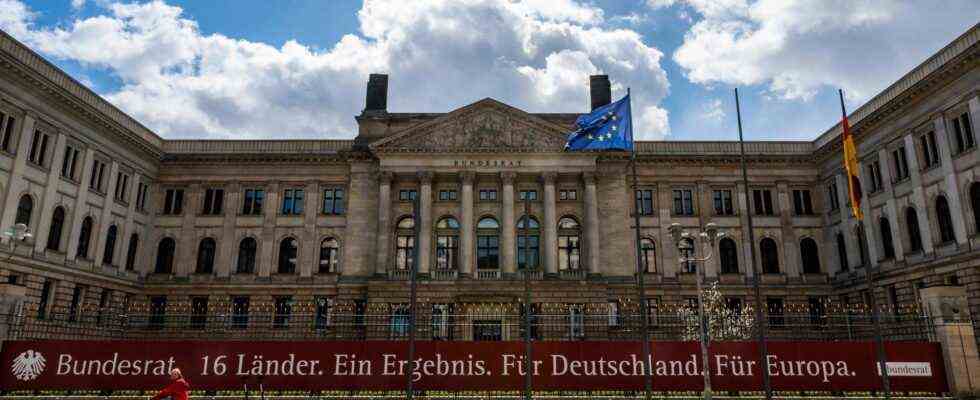Status: 17.09.2021 2:06 p.m.
As a consequence of the mask scandal, the transparency rules for MPs have been tightened. The Federal Council also approved the new regulation, which, among other things, expands the obligations to disclose additional income.
In future, parliamentarians will have to give more precise details of income from secondary employment and company investments. The Bundesrat approved the tightening of the transparency rules for members of parliament that had been passed by the Bundestag in June.
The exact amount must be specified
Income is now notifiable for members of the Bundestag if it exceeds the amount of 1000 euros per month or 3000 euros for the whole year. It is also stipulated that the exact amount must be published “in euros and cents”.
If MPs hold shares in corporations or partnerships, they must now display and publish these from five percent. So far it has been 25 percent. Income from such participations must be disclosed as well as stock options.
Harsher penalties for bribery
Lobbying activities by members of the Bundestag vis-à-vis the Federal Government or the Bundestag are also prohibited. Members of parliament are also no longer allowed to accept fees for lectures in connection with parliamentary work. Expense reimbursements for voluntary work, for example in associations, remain permitted.
With the reform, the penalties for MPs who allow themselves to be bribed and vice versa for people who bribe MPs will be significantly increased in the Criminal Code. In future, this will be punished with a prison sentence of at least one year and up to ten years. So far, such cases have been threatened with imprisonment of a maximum of five years or a fine.
Union gave up resistance
The background to the new regulation is, among other things, the scandal over lucrative mask deals, in which especially parliamentarians from the CDU and CSU were involved.
The Union had long resisted the stricter rules. The new law was finally passed in the Bundestag not only with the votes of the coalition, but also with the support of the Greens and the Left Party. The new regulations can now come into force when they are published in the Federal Law Gazette.
Electronic communication with courts is made easier
The Federal Council also approved a bill on the digitization of the judiciary. In future, citizens should be able to communicate more easily with judicial authorities electronically. There are plans to set up an electronic “Citizen and Organization Mailbox” (eBO), which will enable electronic documents to be sent securely to the courts and back to the mailbox owner.
Where regulations require the written form, the use of this post office box should be recognized for this. In practice, this also has an impact on the enforcement of court decisions. The new law also provides for a ten percent increase in bailiff’s fees.
Reduction of emissions in traffic
In addition, the new law on the greenhouse gas reduction rate finally passed the state chamber. Fuel suppliers must gradually reduce CO2 emissions from gasoline and diesel by 2030 by 25 percent. This should also support the expansion of electromobility and the use of green hydrogen and advanced biofuels. The reduction in emissions had been improved by the Bundestag compared to the original government proposal.
The law implements an EU directive into German law. The share of renewable energies in transport is to increase to 32 percent by 2030, which goes well beyond the requirements of the EU. For the first time, aviation fuel is also included in the rules. From 2026 the share of renewable energies must be at least 0.5 percent, from 2030 at least two percent.
New rules for charging stations
Electric car drivers will soon be able to pay more often by card when refueling at the charging station. From July 2023, readers for common debit or credit cards must be installed in all new charging points. The Federal Council approved a corresponding ordinance by the Federal Government. In addition, there must be an authentication option for cashless payments at the charging station itself or in its immediate vicinity. In addition, newly built charging points must have an interface that enables data on the location and occupancy to be transmitted.
This regulation has met with criticism because operators fear additional costs and delays in expanding the charging station network. Schleswig-Holstein’s Economics and Transport Minister Bernd Buchholz (FDP) pointed out in the Federal Council that credit card readers were no longer up to date. Therefore, “it would be wise to bet on not doing it and instead allowing payment via PayPal or other online payment services,” he pointed out. However, a corresponding amendment was rejected.
One aim of the new regulation is to avoid that drivers of an electric car, for example, first have to go through a cumbersome registration process by local public utilities before they can charge their vehicle.
The attempt to abolish Paragraph 219a fails
In contrast, the initiative of several state governments led by the SPD and the Left Party to abolish the controversial paragraph 219a did not find a majority. This prohibits advertising for abortions. The prohibition also includes factual information from doctors about offers for abortion.
“Pregnant women should be able to decide independently how and with which doctor they want to have an abortion carried out through information”, the initiators Berlin, Brandenburg, Hamburg, Thuringia and Bremen justified their request. Even with a majority in the Bundesrat, the practical impact would have been small for the time being, as there is no majority in the outgoing Bundestag to abolish Paragraph 219a.
In its last meeting before the federal elections, the Bundesrat will also discuss the federal budget for 2022 and medium-term financial planning up to 2025.
Federal Council: New transparency rules for members of the Bundestag
Björn Dake, ARD Berlin, September 17, 2021 12:15 p.m.

